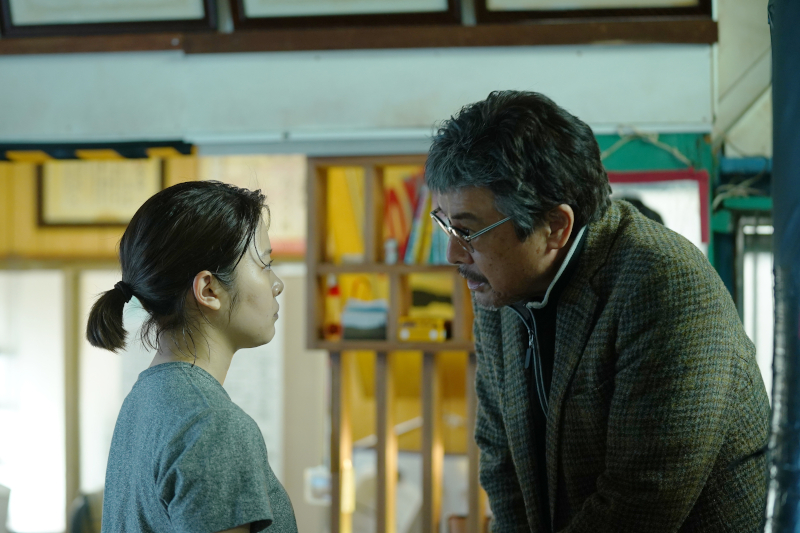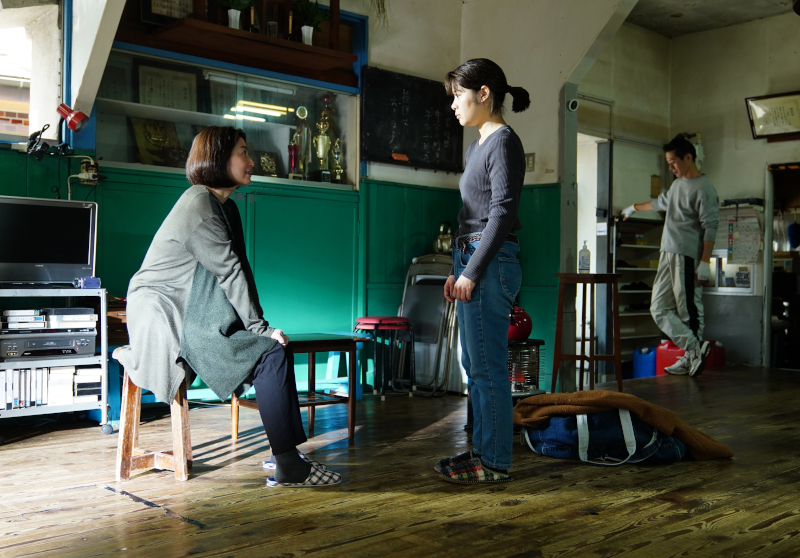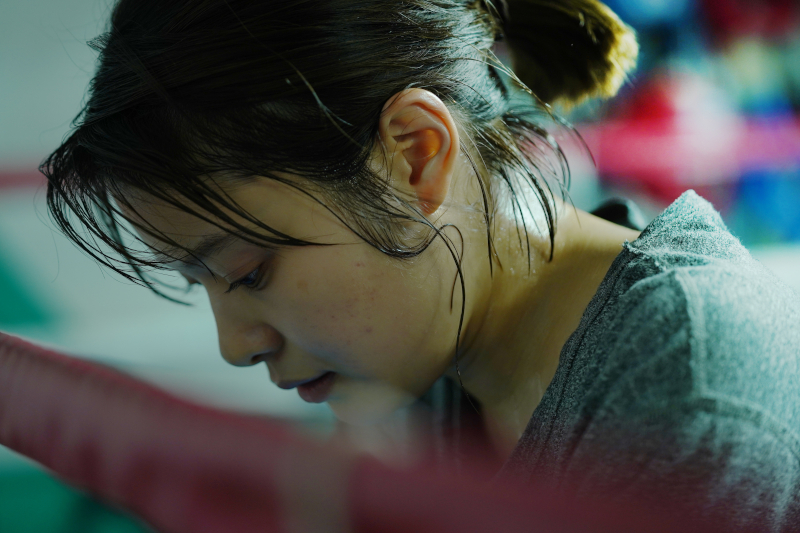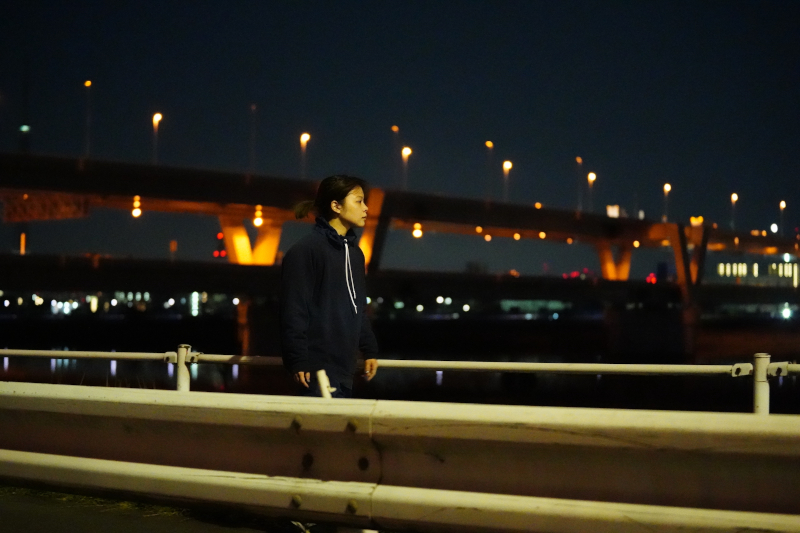Director – Sho Miyake – 2022 – Japan, France – Cert. 12 – 99m
The first half hour ****
The rest ***1/2
A completely deaf, young woman trains in the boxing ring at the local gym and turns professional, but when the gym’s closure is announced, she loses the focus needed to carry on – out in UK cinemas and on Curzon Home Cinema from Friday, June 30th
Young woman Keiko (Yukino Kishii from Foreboding, Kiyoshi Kurosawa, 2017) has suffered since birth (a title tells us at the start) from sensorineural hearing loss. She and her younger brother (Himi Sato) rent a flat in Tokyo’s Arakawa neighbourhood, where she has taken up boxing at the local gym. While her brother plays music on an electric guitar for his girlfriend Hana, in the next room, Keiko scribbles obsessively writing down her progress at the gym in her notebook.
She beats an opponent by the narrowest of margins. As the old chairman of the boxing club (Tomokazu Miura from Detective Chinatown 3, Chen Sicheng, 2021; The Outrage, Takeshi Kitano, 2010; Arietty, Hiromasa Yonebayashi, 2010; The Taste Of Tea, Katsuhiro Ishii, 2004) explains to a journalist interviewing him later at the gym, Keiko can’t hear either the bell or anything the ref says. However, he notes, she has good eyes. In the next breath, he comments that she has no special talent.

If she’s a lost cause, the gym seems fully invested in training her, perhaps seeing that the training and professional status gives her some sort of purpose. So intent on her training is the institution that at least one other gym regular gets fed up with the lack of attention others receive, and quits in disgust.
Keiko works in her day job as a hotel chambermaid, where one of her co-workers is impressed by her modest boxing success. Her mother (Hiroko Nakajima from True Mothers, Naomi Kawase, 2020) praises her daughter and everything the chairman has done for her one minute, only to tell her the next it’s time she quit. Her brother takes up gym training himself to encourage her.

With the chairman’s health worsening comes a warning from his doctor of the danger of a second stroke, so in agreement with his wife (Nobuko Sendo) the chairman decides it’s time to close the gym. The staff make alternative arrangements for Keiko, When the replacement gym they find her is much further way from her flat than the current one, she loses the will to carry on, and although she doggedly keeps going, her training suffers.
The first half hour is reasonably effective as a drama, showing us the girl working out, the proceedings executed with very little dialogue. Perhaps the strongest moment is a lengthy shot of the girl punching her trainer’s mitts and repeatedly ducking as his hand moves towards her head, an instinctive rhythm within which both pupil and teacher are completely enveloped in the moment, producing incidental percussive beats that are almost hypnotic in their effect.
Much use is made of sign language, a little at the gym (where she also communicates by means of a small, handheld whiteboard and stylus), a lot more at home and later, poignantly, when Keiko is introduced to her new trainer at the replacement gym who has only a rudimentary command of sign language having just started to learn it for her new, incoming gym member.

Overall, this does a nice job of conveying the deaf experience, both outside of and during the pandemic. (For that matter, it’s refreshing to see a film which actually acknowledges that the pandemic happened and attempts with a reasonable degree of success to incorporate it into a film narrative.) Where people wear face masks, Keiko can’t lip-read and therefore isn’t able to understand what they’re saying, unless or until they remember to lower their masks, so she can see their lips move.
Elsewhere, people go about their lives under pandemic conditions, with aural public announcements about staying at home where possible, not going out unless it’s really necessary and wearing masks at all times. While no masks are worn by staff or members training at the gym, a boxing match during the pandemic sees the audience all masked up. It’s a fascinating glimpse into how the cleanliness- and efficiency-obsessed Japan handled everyday life under pandemic conditions.

Strangely affecting scenes slow the pace of the whole thing down while they show Keiko standing or exercising alone or with the gym chairman on a stretch of waste ground at the river’s edge, with the sounds of water, traffic and passing trains (which she can’t hear) around her.
This is a narrative about someone dedicated to achieving something – Keiko and her desire to succeed as a pro boxer – who then loses the will to continue. Unfortunately, as she does so, the film itself likewise seems to lose focus, meaning that after a promising opening half hour, it becomes much less compelling and more of an effort to watch. This may be in part because the piece is based on the experience of a real life deaf woman, who is also one of the writers, and it may be that its attempt to accurately and slavishly represent her historic truth undermines the task of pacing a genuinely captivating story.
Small, Slow But Steady is out in cinemas and on Curzon Home Cinema in the UK from Friday, June 30th.
Trailer:
